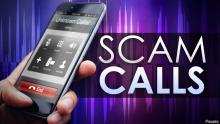
BY DEB ESCOBAR, on January 12, 2018
My house phone kept ringing the other day, but I let the calls go through to voicemail. The message purported to be from the IRS, saying I had a "serious impropriety" on my tax returns and that if I did not call them back within 24 hours the police would execute a warrant for my arrest. The caller ID identified the number as coming from Littleton, Colorado. I knew this was a scam but was annoyed at the fact that they were so persistent, phoning several times over two days. I called my local police department and spoke to an officer who informed me that there was nothing that could be done to investigate. Even though I had "a phone number" to call back, they said that the phone number is not in Colorado, but was most likely originating from outside the United States through a technology known as "spooling."
Curious, I decided to do some research on phone scams and what I discovered was truly alarming. The American Journal of Public Health published a study in August 2017 on the financial fraud/scam victimization of older adults that found "approximately 1 of every 18 cognitively intact, community-dwelling seniors" fall victim to financial scams each year. That statistic goes much higher when you consider seniors with dementia or other illnesses that impair reasoning and when you consider the fact that due to guilt or embarrassment, many do not admit to falling prey to such scams. A CNBC story, also in August 2017, gave a "low estimate" of the financial victimization of seniors of $36 BILLION a year. The Center for Disease Control and Prevention recognizes this financial exploitation as a serious public health problem, often leading to the inability to pay for essentials like food, utilities, and healthcare.
New York Attorney General Eric Schneiderman has detailed five most common types of phone fraud that targets older adults. Along with the IRS Scam I described above, the other four are:
1. Grandparent Scam - The caller pretends to be a grandchild who is out of town and in a desperate situation that requires cash, and they ask for money to be wired to them - to bail them out of jail, get their car repaired, etc.
2- Jury Duty Scam - The caller claims to be a court officer and states that you failed to report for jury duty and a warrant has been issued for your arrest. You can pay for the warrant or be arrested. They typically ask that money be wired or loaded onto a prepaid card.
3. Lottery Scam - Many lottery/prize scam offers are delivered by mail, but there are also those who phone with the news that you've won money in a foreign lottery. They ask for a payment up-front for taxes and fees so that you can be sent your winnings. My elderly cousin, who had dementia, gave away $40,000 of his life savings to one of these callers.
4. Utility Scam - The caller states that your power is about to be cut off due to unpaid bills. They want money sent to them within 24 hours by money transfer or prepaid card.
There are many other variations of cons. Here are some warning signs of phone scams:
- Pressure to act now, within limited time - usually 24 hours.
- Asking for you to pay fees or postage and handling for a prize.
- Asking for money, a credit card or bank account number, or a meeting at your bank.
- Stating that there is no need/no time to check with your family, lawyer, etc.
- Using pressure techniques like "You can't afford to miss this opportunity."
The best advice the police department could give me was to either not answer the phone or hang up immediately. Do not engage in conversation because these con artists are experts at fishing for information. In addition, if you have a digital phone, your cable or phone company should be able to guide you to an app that will block most, but not all, telemarketing calls after just one ring (it did not block the IRS call because it seemed to come from a legitimate phone number). Nomorobo is one example of such an app. You can also request that specific numbers be blocked.
The FBI recommends that you always ask for and wait until you receive written information about any offer or charity. Check out unfamiliar companies with Better Business Bureau, the State Attorney General, or watchdog groups like the National Fraud Information Bureau. Ask for contact information, but check them out - con artists often give out false names and telephone numbers.
NEVER send money or give out personal information such as credit card numbers and expiration dates, bank account numbers, dates of birth, or social security numbers. Establish this policy in your mind ahead of time, and know what you will say if someone asks for such information over the phone. If you do suspect a call is real, contact the business or charity yourself at a known phone number rather than at the phone number given by the caller.
Lastly, identify a support system - a trusted family member or professional that you can consult with on any phoned or written offers, requests for charity, or business opportunities.
